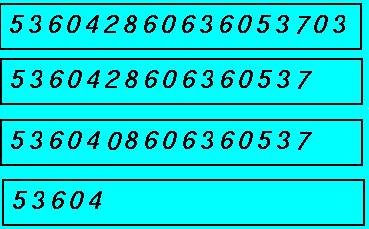hdu1404 Digital Deletions------SG
来源:互联网 发布:基础编程入门教程 编辑:程序博客网 时间:2024/05/27 19:27
Digital Deletions
Time Limit: 4000/2000 MS (Java/Others) Memory Limit: 65536/32768 K (Java/Others)Total Submission(s): 1238 Accepted Submission(s): 449
Problem Description
Digital deletions is a two-player game. The rule of the game is as following.
Begin by writing down a string of digits (numbers) that's as long or as short as you like. The digits can be 0, 1, 2, 3, 4, 5, 6, 7, 8, 9 and appear in any combinations that you like. You don't have to use them all. Here is an example:

On a turn a player may either:
Change any one of the digits to a value less than the number that it is. (No negative numbers are allowed.) For example, you could change a 5 into a 4, 3, 2, 1, or 0.
Erase a zero and all the digits to the right of it.
The player who removes the last digit wins.
The game that begins with the string of numbers above could proceed like this:

Now, given a initial string, try to determine can the first player win if the two players play optimally both.
Begin by writing down a string of digits (numbers) that's as long or as short as you like. The digits can be 0, 1, 2, 3, 4, 5, 6, 7, 8, 9 and appear in any combinations that you like. You don't have to use them all. Here is an example:

On a turn a player may either:
Change any one of the digits to a value less than the number that it is. (No negative numbers are allowed.) For example, you could change a 5 into a 4, 3, 2, 1, or 0.
Erase a zero and all the digits to the right of it.
The player who removes the last digit wins.
The game that begins with the string of numbers above could proceed like this:

Now, given a initial string, try to determine can the first player win if the two players play optimally both.
Input
The input consists of several test cases. For each case, there is a string in one line.
The length of string will be in the range of [1,6]. The string contains only digit characters.
Proceed to the end of file.
The length of string will be in the range of [1,6]. The string contains only digit characters.
Proceed to the end of file.
Output
Output Yes in a line if the first player can win the game, otherwise output No.
Sample Input
000120
Sample Output
YesYesNoNo
Author
ZHENG, Jianqiang
Source
Zhejiang University Local Contest 2006 Preliminary
Recommend
Ignatius.L
一串由0~9组成的数字,可以进行两个操作:1、把其中一个数变为比它小的数;2、把其中一个数字0及其右边的所有数字删除。
两人轮流进行操作,最后把数字删除的人获胜,问前者胜还是后者胜。
字符串长度为1-6,前者胜输出Yes,否则输出No.
这题话说能够暴搜sg值来求,我不得不说下面这个代码真的很巧妙,所以摘抄下来了。
/*HDU 1404*/#include<stdio.h>#include<math.h>#include<iostream>#include<string.h>using namespace std;const int MAXN=1000000;int sg[MAXN];int get_length(int n)//得到整数n的位数{ if(n/100000) return 6; if(n/10000) return 5; if(n/1000) return 4; if(n/100) return 3; if(n/10) return 2; return 1;}void _extend(int n)//sg[n]=0;表示n为后者必胜 //那么所以可以一步变成n的都是前者必胜{ int len=get_length(n); int i; for(i=len;i>=1;i--)//每一个位上加上一个数 { int m=n; int base=1; for(int j=1;j<i;j++) base*=10; int tmp=(m%(base*10))/base; for(int j=tmp;j<9;j++) { m+=base; sg[m]=1;//m为前者必胜点 } } if(len!=6)//长度小于6,则可以在后面加0开头的 { int m=n; int base=1; for(int i=len;i<6;i++) { m*=10; for(int b=0;b<base;b++) sg[m+b]=1; base*=10; } }}void fun(){ memset(sg,0,sizeof(sg)); sg[0]=1; for(int i=1;i<MAXN;i++) { if(!sg[i]) _extend(i); }}int main(){ char str[8]; int n; fun(); while(scanf("%s",&str)!=EOF) { if(str[0]=='0') //第一个数字是0,则前者必胜 { printf("Yes\n"); continue; } int len=strlen(str);//第一个数字非0,再转化成整型数 n=0; for(int i=0;i<len;i++) { n*=10; n+=str[i]-'0'; } if(sg[n]) printf("Yes\n"); else printf("No\n"); } return 0;}- hdu1404 Digital Deletions------SG
- hdu1404 Digital Deletions SG打表
- Hdu1404 Digital Deletions(暴力SG博弈)
- hdu1404 Digital Deletions
- Hdu1404 Digital Deletions
- hdu1404 Digital Deletions (状压+dfs)
- SG函数 hdu 1404 Digital Deletions
- sg函数 hdu 1404 Digital Deletions
- hdu 1404 Digital Deletions (SG函数)
- HDU 1404 Digital Deletions [SG]【博弈】
- HDU1404-sg
- hdu1404 sg
- hdu 1404 Digital Deletions
- Digital Deletions+博弈
- hdu 1404 Digital Deletions
- Hdu 1404 Digital Deletions
- HDU 1404 Digital Deletions
- hdu1404(sg的应用)
- 完全用Linux工作,抛弃window/王垠
- 动态规划 求解 Minimum Edit Distance
- 困扰我快一个月的BUG
- windows 服务安装脚本
- libxml 解析xml文档
- hdu1404 Digital Deletions------SG
- hdu 4002 收获非常大的一个题 多功能大数模板的应用
- 清华梦的粉碎—写给清华大学的退学申请 /王垠
- hdu 4339 线段树+二分
- maven 仓库文件配置3
- .NET async await 关键字最简单例子
- Java菜鸟进阶篇(一)
- jxl生成EXCEL
- FAT VFAT (FAT32) NTFS有什么区别?


